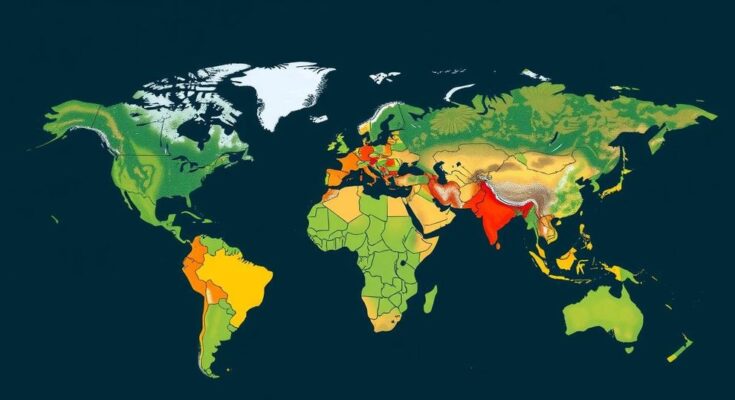Wealthy nations continue to evade responsibility for climate change, failing to pledge adequate funding at COP29, which leaves poorer countries vulnerable and lacking resources needed to mitigate climate impacts. Plans fell significantly short of economists’ recommended figures, leading to criticism from various leaders and experts regarding the future effectiveness of international climate efforts without substantial commitments.
Industrialized nations, which have significantly contributed to the climate crisis, demonstrate a troubling reluctance to fulfill their financial obligations towards resolving the issue. At the recent COP29 conference, expectations were high that these nations would begin to assume responsibility for their role in climate change. Unfortunately, their failure to adequately fund initiatives leaves poorer countries in peril, unable to finance adaptations to extreme weather events or invest in necessary clean energy sources to reduce emission levels.
The last-minute agreements reached at COP29 resulted in a mere fraction of the funding required for developing nations. A commitment of $300 billion annually to poorer countries by 2035 starkly contrasts with the $1.3 trillion deemed essential by economists. Furthermore, the suggested alternate funding routes, primarily dependent on the private sector or global taxes on fossil fuels, pose additional risks of increasing debt for developing nations.
COP President Mukhtar Babayev expressed disappointment at the outcome, highlighting the inadequacies in the funding pledge which fell drastically short of what is scientifically recognized as necessary to avert catastrophic climate change. His comments reflected the broader sentiment that wealthier nations, while vocal about climate change, showed little willingness to back words with meaningful actions, leaving developing nations not only anxious about future conditions but also ill-equipped to handle current climate emergencies.
The designated $300 billion pales in comparison to the costs associated with recent disasters, such as the $17 billion needed to recover from flooding in Brazil. Experts and climate activists voiced their discontent with the final deal, revealing a growing sense of betrayal among developing countries, as reflected in the remarks of Mohamed Adow of Power Shift Africa who described the agreement as “a betrayal of people and planet by wealthy countries who claim to take climate change seriously.”
Moreover, the failure to account for inflation means this commitment will diminish in value over time, further exacerbating the situation. Nicholas Stern, a leading climate economist, underscored the urgency in financing climate initiatives, noting that delaying action will only heighten costs and consequences in the long term. Additionally, voices from global leaders, such as Spain’s Prime Minister Pedro Sánchez, stressed the immediate toll of climate change.
In light of these failures, calls for increased ambition and a restructuring of the COP process are escalating. Preceding host Brazil’s Minister of Environment and Climate Change, Marina Silva, stressed commitment to more substantial emission reduction targets at the upcoming COP30. An open letter from a notable coalition of global leaders advocates for reform in the COP framework, emphasizing a need for decisive action to prevent further climate-induced disasters.
The disappointing outcomes of COP29 have illustrated the necessity of re-evaluating strategies in addressing climate change. A collaborative, proactive approach is imperative if the global community is to meet essential climate objectives and avert impending catastrophe.
The text discusses the ongoing issues surrounding climate change funding at the international level, particularly focusing on the inequities between rich and poor nations. The COP29 conference highlighted the lack of financial commitments from wealthy nations, which were expected to pledge more significant support for combating climate change impacts in developing countries. Historically, industrialized nations have contributed the most to global emissions, yet they remain reluctant to allocate the necessary funds to help poorer countries adapt to these changes. The funding debates are framed against the backdrop of urgent calls from experts, leaders, and activists for immediate and substantial action to address escalating climate challenges.
In summary, COP29 exemplified the challenges inherent in securing equitable climate financing, with wealthy countries failing to deliver on their commitments towards poorer nations. The delegates’ small financial pledges are inadequate relative to the increasing climate-related damages that developing nations are experiencing. As the urgency for action grows, the necessity for a revised and ambitious COP approach becomes apparent, warranting immediate attention to ensure climate goals are met and to mitigate future crises.
Original Source: bylinetimes.com




